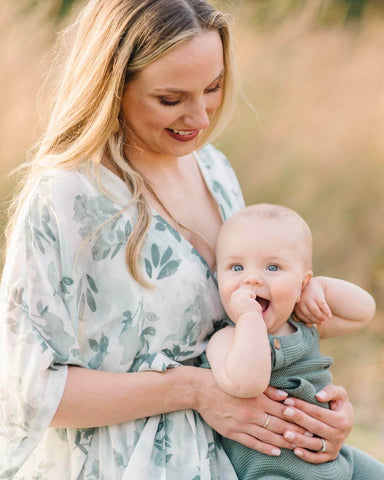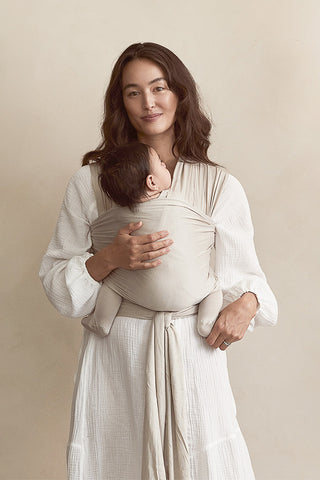Postpartum is a wild ride. Between the waves of intense emotions and the physical recovery from delivery, to adjusting to a whole new person in your family—it’s a lot to handle. Danielle Smith experienced that ride firsthand after giving birth to her son and was shocked to learn just how little support there was for moms navigating those tender and tumultuous months postbirth. Now, as a certified postpartum doula, she helps provide women with the postpartum support they need and deserve. We sat down with Danielle to glean some of her best tips for postpartum recovery.

Can you start by introducing yourself? How long have you been a postpartum doula, and what inspired you to become one?
My name is Danielle Smith. I am a full-time nurse, part-time postpartum doula, wife, and most importantly, mother to two. My son, Cooper, is 3 years old and my daughter, Reese, will be 1 in May. I had my son in February 2021 and while I was very prepared for labor and delivery (thank you, @mommy.labornurse!), I prepared very little for postpartum.
I was the first out of my friends and family to have a baby, so I had very little recent experience with newborns and postpartum. I was relying solely on the phrase, "It will just come naturally after the baby is born." I babysat multiple children for most of my adolescent years and always loved being around babies. That should make things easy, right? While I had a tremendous amount of support, I quickly learned that I should have prepared for postpartum as much as I had for labor and delivery. I found myself googling “Is this normal?” in the middle of the night on multiple occasions.
Luckily, my postpartum period was uneventful and the transition into motherhood was what I would consider a success. But I couldn't stop thinking about how much worse it could have gone if I didn't have a good foundation of knowledge around caring for a newborn and postpartum recovery because of my nursing studies. Why is it that expecting mothers are so quick to prepare for labor, but never think to prepare for what happens next? Is it because we are taught that it will just come naturally? Is it because the historical village of support is starting to dwindle? Is it because the pressure put on new moms has increased dramatically from decades ago? No matter the reason, I realized there was a big gap in education and support for expecting families.
This drove me to start my Instagram account, @balanceafterbirth. My goal for this account was to connect with other new moms and provide inspiration around finding balance through the transition into motherhood. I connected with several mothers in the same stage of life I was in through starting this account. What I found was one common theme: Where is the support and education for postpartum?
As a visiting nurse, I couldn't help but think, "I would love to go to the homes of new moms to care for and support them after having a baby,” but that job doesn't exist—or does it? For almost all other illnesses or injuries after a hospitalization, the individual would go home with support. Why not for new mothers and babies? Then one day I stumbled upon the role of postpartum doula. It was exactly what I wanted to do! So, in March 2021, I enrolled in a postpartum doula course through DONA International.
After taking the course, I pivoted the focus of my Instagram account to be more educational and supportive of other new moms. My goal is to be the virtual mom friend you wish you had in the early postpartum days. I hope that mixing a variety of educational content as well as sharing my real-life mom experiences (and a little humor, because we all need a good laugh) will help someone else in the thick of postpartum and motherhood. I strongly believe moms who are supported and educated on what to expect during the postpartum period have a much happier and more successful transition into motherhood.

For those who might be unfamiliar with what a postpartum doula does, can you share what their role is?
A postpartum doula provides physical, emotional and educational support to families during the postpartum period. Their role can vary based on the needs of the family but generally includes:
- Emotional Support: They offer reassurance, encouragement and a listening ear to new parents as they navigate the challenges of early parenthood.
- Physical Support: They assist with newborn care, including feeding (breastfeeding or bottle-feeding), diapering, bathing, and soothing techniques. They may also help with light household tasks such as meal preparation, laundry, and tidying up to ease the workload for the parents.
-
Education and Information: Postpartum doulas provide evidence-based information and guidance on newborn care, infant feeding, postpartum recovery, and other relevant topics.
The role of a postpartum doula may also include:
- Sibling Care: If there are older siblings in the family, postpartum doulas may provide support and activities to help them adjust to the new baby and the changes in the family dynamic.
-
Resource Referrals: They can connect families with community resources and support services, such as lactation consultants, mental health professionals, support groups, or other healthcare providers as needed.
Overall, the goal of a postpartum doula is to nurture and support the family during the transition to parenthood, promoting a positive postpartum experience and helping to foster a strong bond between parents and their newborn.
Can you walk us through some of your tips for helping mamas recover from birth both physically and emotionally?
My number one tip for moms in the first few weeks postpartum is to take care of yourself just as you would take care of your baby. Don't rush your recovery. Remember, it took nine months to grow your baby, it is going to take some time to physically recover and adjust to life with your new baby. Just as you would make sure your baby is fed, rested, and cared for, you should do the same for yourself.
Always remember, if you are feeling overwhelmed physically or emotionally, please reach out to someone for help. You weren't meant to do postpartum alone. It's okay to ask for help and use the resources available to you and your baby. The transition into motherhood is big and you deserve to feel confident, supported, and empowered during this period of your life.
Are there any products you specifically swear by for moms recovering from birth?
I recommend keeping a postpartum basket in each bathroom of your home that you can easily access when needed. In the basket I recommend:
- Mesh underwear: Frida Mom disposable panties were my favorites!
- Peri bottle: Frida Mom makes an awesome peri bottle, but the ones they give you at the hospital work just fine
- Pads: I loved the Always Ultra Thin brand, but any brand pads work
- Witch Hazel pads
- Lanolin ointment (if nursing)
-
Disposable nursing pads (if nursing)
Other postpartum must-haves:
- Comfortable clothes. I loved treating myself to a matching sweatsuit, or a few nursing friendly tops to wear in the early postpartum days. Having something new and cozy made me feel good. There are companies who make breastfeeding friendly sweatshirts with zippers on the side that I LOVED. MoveMama Apparel and Kindred Bravely are two of my favorites!
- A big water bottle. I loved having a big water bottle with a handle on it next to me. I found myself relaxing on the couch snuggling my baby quite a bit those early days, and it was nice to not have to get up multiple times to refill my water bottle.
- Grab-and-go snacks. Granola bars, protein shakes, fresh cut fruit and muffins were a few of my favorite snacks to eat postpartum. It is nice to be able to have something prepared to grab while you’re holding or feeding baby.
-
A good baby carrier! This was ESSENTIAL to the early postpartum days with my second. Being able to hold my baby close to me while having my hands free to tend to my toddler, or do something around the house, was a lifesaver. Solly Baby is my favorite wrap, and Wildbird was my go-to for a more structured carrier.

If a mom only remembered one piece of advice when it came to her postpartum recovery, what would you want it to be?
My number one piece of advice for a new mom is to be kind to yourself. Remember, whether it is your first, third, or fifth child, this is a transition for you and your family. You have never been this child’s mother in this stage that they are in. While your baby is growing and learning, so are you. There will be ups and downs. Some days you may feel like you have it all together and others may feel like the world is crashing down on you. Trust your instincts, and remember that you are doing the best you can for your baby. Your baby is so incredibly lucky to have you as their mother and to be loved by you. You are doing a great job.










